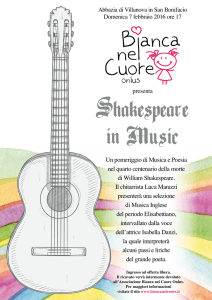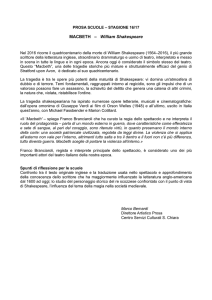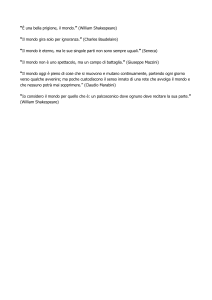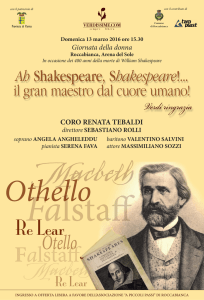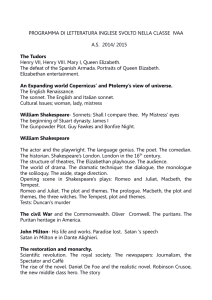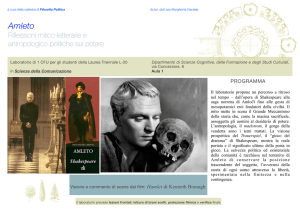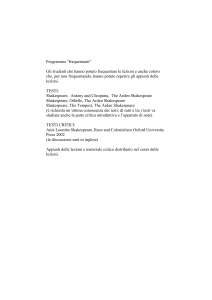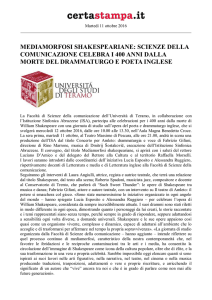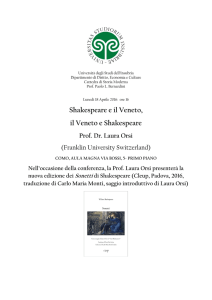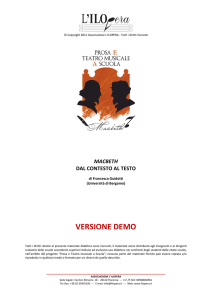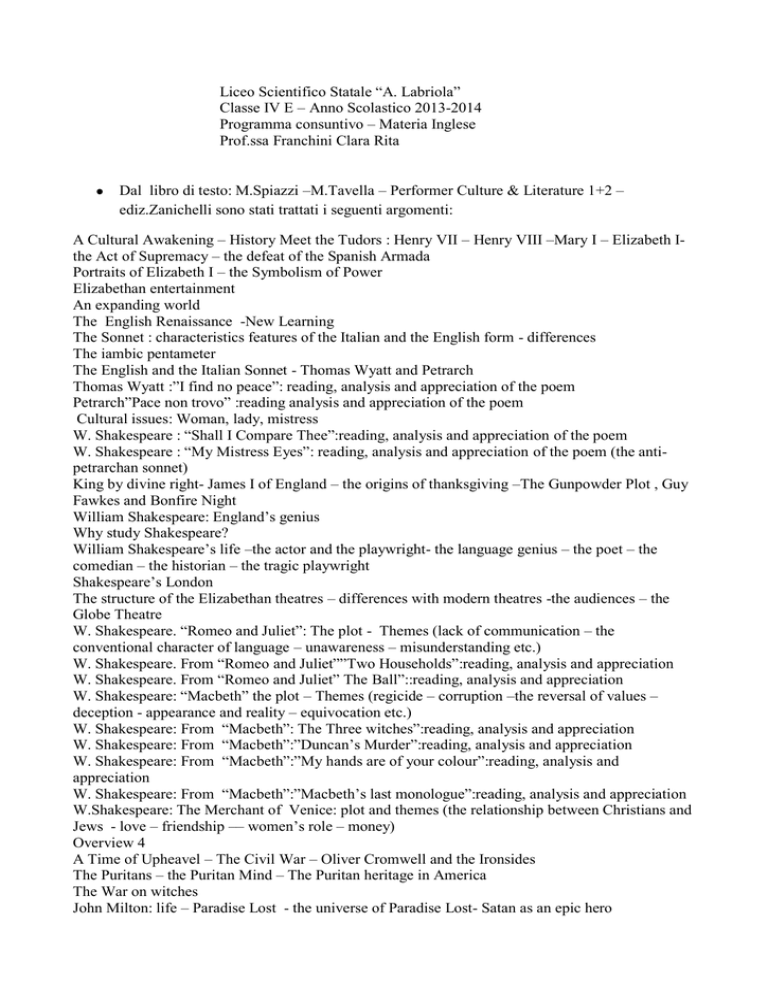
Liceo Scientifico Statale “A. Labriola”
Classe IV E – Anno Scolastico 2013-2014
Programma consuntivo – Materia Inglese
Prof.ssa Franchini Clara Rita
Dal libro di testo: M.Spiazzi –M.Tavella – Performer Culture & Literature 1+2 –
ediz.Zanichelli sono stati trattati i seguenti argomenti:
A Cultural Awakening – History Meet the Tudors : Henry VII – Henry VIII –Mary I – Elizabeth Ithe Act of Supremacy – the defeat of the Spanish Armada
Portraits of Elizabeth I – the Symbolism of Power
Elizabethan entertainment
An expanding world
The English Renaissance -New Learning
The Sonnet : characteristics features of the Italian and the English form - differences
The iambic pentameter
The English and the Italian Sonnet - Thomas Wyatt and Petrarch
Thomas Wyatt :”I find no peace”: reading, analysis and appreciation of the poem
Petrarch”Pace non trovo” :reading analysis and appreciation of the poem
Cultural issues: Woman, lady, mistress
W. Shakespeare : “Shall I Compare Thee”:reading, analysis and appreciation of the poem
W. Shakespeare : “My Mistress Eyes”: reading, analysis and appreciation of the poem (the antipetrarchan sonnet)
King by divine right- James I of England – the origins of thanksgiving –The Gunpowder Plot , Guy
Fawkes and Bonfire Night
William Shakespeare: England’s genius
Why study Shakespeare?
William Shakespeare’s life –the actor and the playwright- the language genius – the poet – the
comedian – the historian – the tragic playwright
Shakespeare’s London
The structure of the Elizabethan theatres – differences with modern theatres -the audiences – the
Globe Theatre
W. Shakespeare. “Romeo and Juliet”: The plot - Themes (lack of communication – the
conventional character of language – unawareness – misunderstanding etc.)
W. Shakespeare. From “Romeo and Juliet””Two Households”:reading, analysis and appreciation
W. Shakespeare. From “Romeo and Juliet” The Ball”::reading, analysis and appreciation
W. Shakespeare: “Macbeth” the plot – Themes (regicide – corruption –the reversal of values –
deception - appearance and reality – equivocation etc.)
W. Shakespeare: From “Macbeth”: The Three witches”:reading, analysis and appreciation
W. Shakespeare: From “Macbeth”:”Duncan’s Murder”:reading, analysis and appreciation
W. Shakespeare: From “Macbeth”:”My hands are of your colour”:reading, analysis and
appreciation
W. Shakespeare: From “Macbeth”:”Macbeth’s last monologue”:reading, analysis and appreciation
W.Shakespeare: The Merchant of Venice: plot and themes (the relationship between Christians and
Jews - love – friendship –– women’s role – money)
Overview 4
A Time of Upheavel – The Civil War – Oliver Cromwell and the Ironsides
The Puritans – the Puritan Mind – The Puritan heritage in America
The War on witches
John Milton: life – Paradise Lost - the universe of Paradise Lost- Satan as an epic hero
J. Milton: From “Paradise Lost””Satan’s Speech”: reading, analysis and appreciation
Satan in Milton and Dante - analogies and differences
C. Marlowe: From “The Tragical History of Doctor Faustus” “Faustus’s Last Monologue”
(photocopy):reading, analysis and appreciation – comparison between Milton’s Satan and
Marlowe’s Faust
The development of human rights
T. Hobbes and J. Locke and their views of man - The universal Declaration of human rights
The scientific revolution – new scientific methods –the Royal society – the Royal society today
Newton’s view of the universe
The Restoration of the monarchy – Charles II – James II – The Glorious Revolution
Sir Christopher Wren – Wren’s secular buildings
Overview 5
Shaping the English character
The birth of political parties – the Tories and the Whigs – modern political parties –the prime
minister and the Cabinet
A golden age – reason and common sense
The means for cultural debate - the first dictionary of the English language
Two newspapers:”The Spectator” and “Il Caffè”
The rise of the novel
D. Defoe and the realistic novel – Defoe’s life and works
D. Defoe :”Robinson Crusoe” :the story – the new middle –class hero – a spiritual autobiography –
the island – the individual and society
D. Defoe :from “Robinson Crusoe””The journal” :reading, analysis and appreciation
D. Defoe :from “Robinson Crusoe””Man Friday”:reading, analysis and appreciation.
J.Swift: life and works – a controversial writer – “Gulliver’s travels” – the story – the sources – the
character of Gulliver
J.Swift from “Gulliver’s Travels” “ Gulliver and the Lilliputians” :reading, analysis and
appreciation
An Age of Revolutions: introduction to the French Revolution and the American Revolution
The Industrial Revolution
Heroes of inventions
Industrial society – how child labour changed the world
The long-term impact of the industrial revolution
Summer reading :”Hamlet” ( durante la trattazione del teatro shakespeariano si è fatto in più
occasioni riferimento all’opera, alla figura di Amleto e ai principali temi della tragedia: usurpation,
corruption, regicide, Hamlet’s inaction, etc.,soprattutto in riferimento a “Macbeth”).
Dal libro di testo: A.Capel W. Sharp – Objective First third edition – Cambridge University
Press (Student’s + workbook) sono state trattate le seguenti unità con relative esercizi,
attività e produzioni scritte (riassunti e writings) sia dallo student’s che dal workbook:
Unit 11: Like Mother, like daughter - 11.1 speaking and listening – 11.2 vocabulary : adjectives
describing personality phrasal verbs and expressions with take -past and present participles
writing: Articles
Unit 12 : 12.1A great idea: reading Invented or discovered by accident?:reading -vocabulary – 12.2
the passive
Units 7-12 revision
Unit 13 :13.1 Education for life:– listening – vocabulary word formation collocations – 13.2
reporting (reported speech) –listening
Unit 16:16.1 Eat to live: reading and vocabulary – collocation/food– 16.2 use of the article
Unit 21: 21.1 Urban decay: vocabulary/collocation – listening -21.2: mixed conditionals- the grand
designer
Roma, 30 maggio 2014
Gli alunni
L’Insegnante
Clara Rita Franchini

